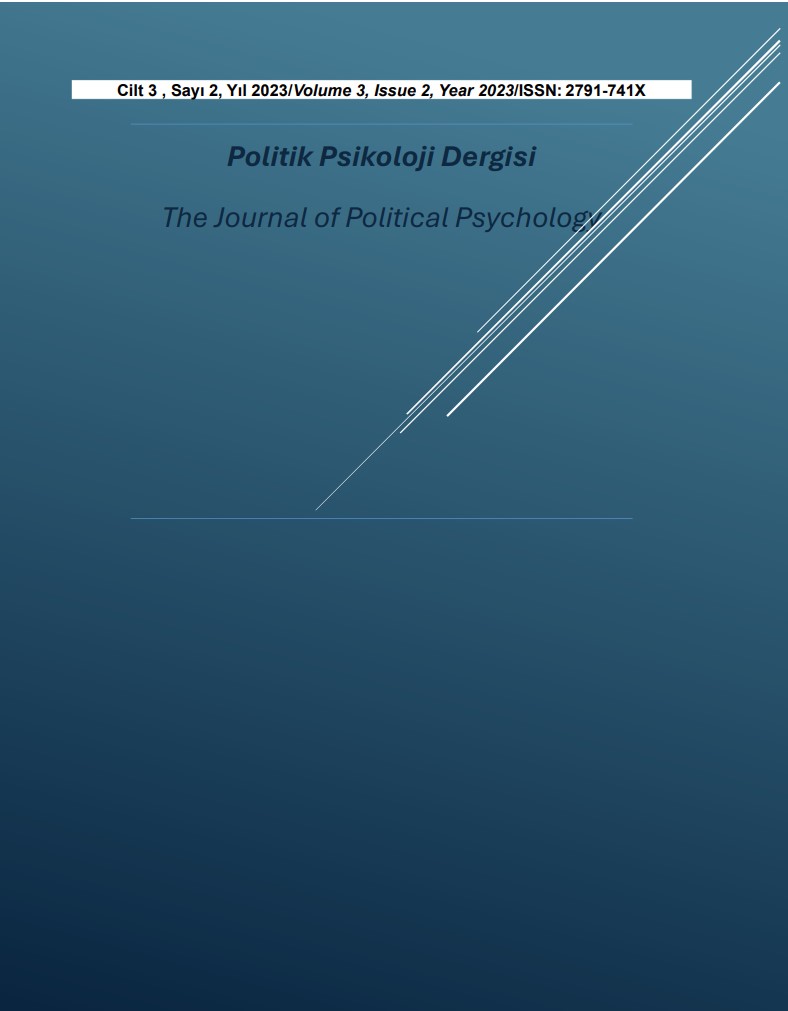UNDERSTANDING PUTIN’S POWER CONSOLIDATION AND SOCIAL IDENTITY FORMATION THROUGH THE NEW YEAR’S EVE SPEECHES FROM 2000 -2015
Keywords:
İktidar, Pekiştirme, Otoriter rejim, Putin, Sosyal KimlikAbstract
Abstract: After Boris Yeltsin resigned from his position on the eve of 2000,
Vladimir Putin became the next President of the Russian Republic. The New
Year’s Eve Speech given by the President was very symbolic and illustrated the
transition from an old Yeltsin regime to a new one with Putin. This article
argues that the speeches given by the President during the New Year’s Eve
could be considered as an important indicator of personalistic power
consolidation of Putin in the country. The main argument is that the more
authoritarian regime (and Putin) becomes the more visible are the changes in
the speeches he gives. Moreover, this article also argues that New Year’s Eve
Speeches play an important role for Social Identity Formation of the country.
References
Bosch, Jeroen Van Den. (2014). Mapping Political Regime Typologies.
Przegląd Politologiczny, 19 - 111.
Cummings, L. (2005). Gorbachev’s Perestroika and the collapse of the Soviet
Union. Drafts on History, 54 – 70.
Geddes, B. (1999). What Do We Know About Democratization After Twenty
Years? Annual Review of Political Science, 115–44.
Haggarty,L.(1996).What Is Content Analysis? MD Teacher18 (2): 99–101.
Henri, T and Turner J.C. (1979). An Integrative Theory of Intergroup Conflict.
The Social Psychology of Intergroup Relations, 94-109.
Hogg, M. A, Knippenberg D.V, and Rast, D. E. (2012). The Social Identity
Theory of Leadership: Theoretical Origins, Research Findings, and Conceptual
Developments. European Review of Social Psychology 23 (1), 258–304.
Levitsky, S., & Way, L. A. (2010). Competitive Authoritarianism: Hybrid
Regimes after the Cold War. Problems of International Politics. Cambridge:
Cambridge University Press.
Linz, J. (2000). Totalitarian and Authoritarian Regimes. Boulder, USA: Lynne
Rienner Publishers.
Loftus, S. (2019). Insecurity & the Rise of Nationalism in Putin's Russia:
Keeper of Traditional Values.
Marshall, G. M and Gurr, T. R (2005). Polity IV Individual Country Regime
Trends, 1946-2013, Retrieved on: 12.12.2018, Retrieved from:
https://www.systemicpeace.org/polity/polity4.html
Medvedev, R., & Shriver, G. (2000). Post-Soviet Russia: A Journey Through
the Yeltsin Era. Columbia University Press.
Parker, E.B, and Holsti, O.R (1970). Content Analysis for the Social Sciences
and Humanities. American Sociological Review, 356.
Sakwa, R.(2014). Russian Politics and Society. London: Routledge.
Tsygankov, A. (2016). Russia's Foreign Policy: Change and Continuity in
National Identity, Lanham:Rowman and Littlefield.
Official New Year Messages are retrieved from:
Politik Psikoloji Dergisi, Cilt: 3 Sayı: 2 Yıl: 2023
The Journal of Political Psychology, Volume: 3 Issue: 2 Year: 2023
Новогоднее обращение исполняющего обязанности Президента
Владимира Путина к гражданам России ( 31 December 1999)
http://kremlin.ru/events/president/transcripts/22280
Новогоднее обращение к гражданам России ( 31 December 2000)
http://kremlin.ru/events/president/transcripts/21153
Новогоднее обращение к гражданам России(31 December 2001)
http://kremlin.ru/events/president/transcripts/21811
Новогоднее обращение к гражданам России ( 31 December 2002)
http://kremlin.ru/events/president/transcripts/21816
Новогоднее обращение к гражданам России ( 31 December 2003)
http://kremlin.ru/events/president/transcripts/22272
Новогоднее обращение к гражданам России ( 31 December 2004)
http://kremlin.ru/events/president/transcripts/22770
Новогоднее обращение Президента Российской Федерации В.В.Путина (
December 2005)
https://www.1tv.ru/news/2005-12-31/228288-
novogodnee_obraschenie_prezidenta_rossiyskoy_federatsii_v_v_putina
Новогоднее обращение к гражданам России ( 31 December 2006)
http://kremlin.ru/events/president/transcripts/23988
Новогоднее обращение к гражданам России (31 December 2007)
http://kremlin.ru/events/president/transcripts/24755
Новогоднее обращение к гражданам России (31 December 2012)
http://kremlin.ru/events/president/news/17260
Новогоднее обращение к гражданам России (31 December 2013)
http://kremlin.ru/events/president/news/20022
Новогоднее обращение к гражданам России (31 December 2014)
Downloads
Published
How to Cite
Issue
Section
License
Copyright (c) 2024 Dilara Sertoğlu

This work is licensed under a Creative Commons Attribution 4.0 International License.



